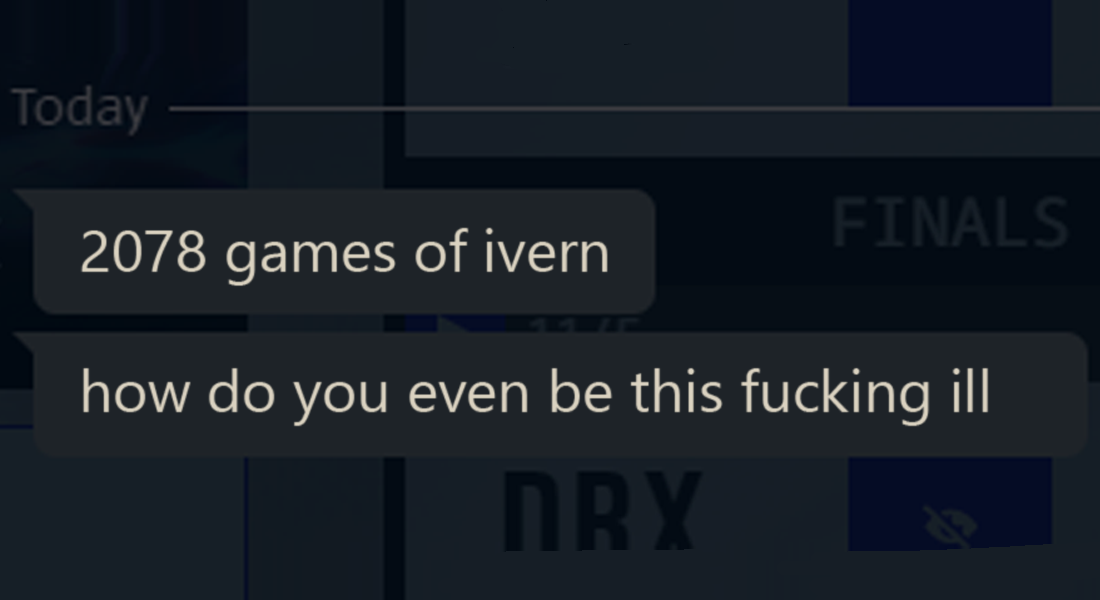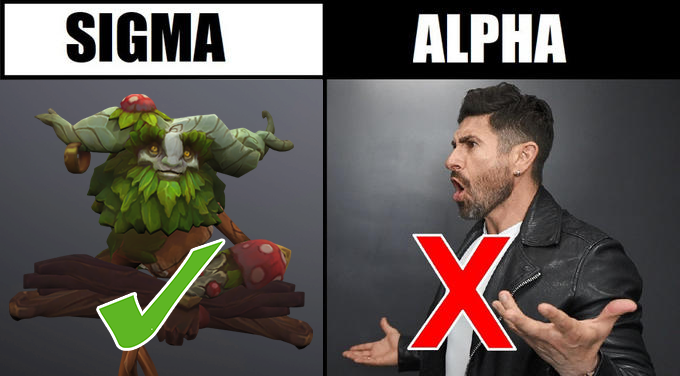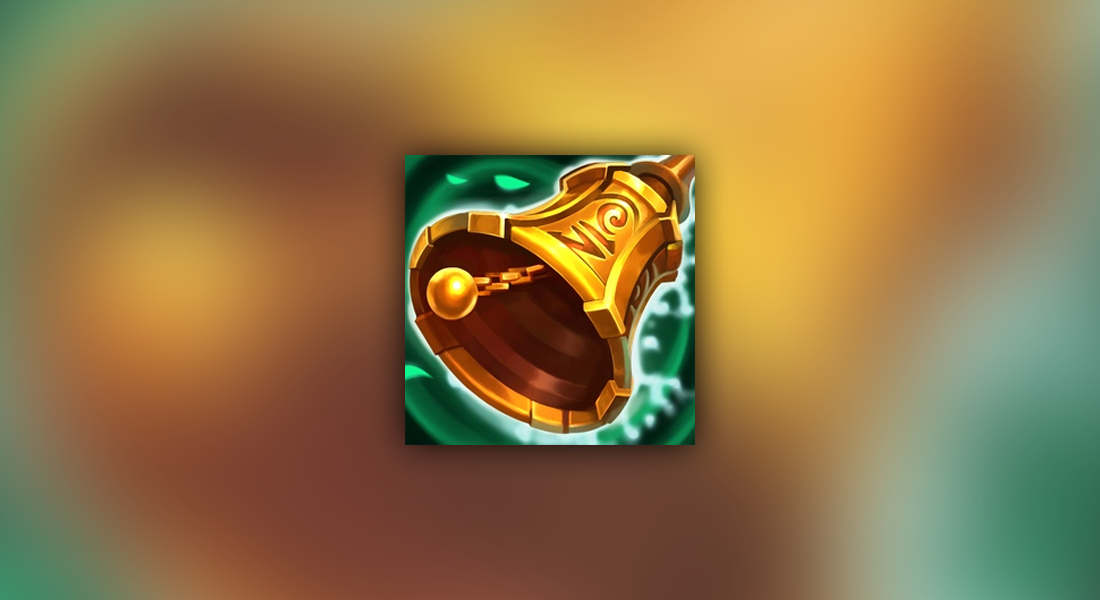Why do you play so much Ivern?
Knowledge Ceilings and how they make Ivern an interesting champion. Am I actually ill?

People often wonder how I can play so many games of Ivern without getting bored. From an outsiders point of view, this sounds like a pretty difficult question to answer, and it definitely would be if I were playing thousands of games of Soraka or Lulu. However, Ivern has some standout traits that keep him consistently interesting to play and learn more about (at least for me). Let's break it down:
Knowledge Ceilings
For this to make sense, I'll need to introduce the concept of ability knowledge ceilings. An ability's knowledge ceiling is based off of how much game and champion knowledge is required to use it at it's most optimal level. Let's look at some examples:

Jax's W: Empower is a great example of an ability with a low knowledge ceiling (in fact it's probably the lowest out of any ability in the game). There isn't any variance to how or when it should be casted, so as long as you're using it as an auto reset you've reached 100% efficiency.

An example of a combat ability with a high knowledge ceiling is Riven's E: Valor. Pretty much any dash will have a decently high knowledge ceiling due to their versatility, but Valor takes it up another level by including a shield. Since it can be used to extend your engage range, dodge an ability, shield an attack, disengage, animation cancel, or any mix of the above, how and when you use the ability becomes the source of great knowledge expression.

In my opinion, the ability with the highest knowledge ceiling is Ashe's E: Hawkshot. If used optimally, a single cast of Hawkshot could win an entire game. However, an incredible amount of knowledge and information would need to go into this decision, meaning that I doubt any human could ever consistently come close to this ideal.
Let's consider what would need to happen for Hawkshot to be used at 100% efficiency. You would need to not only be accurately tracking the possible whereabouts of the enemy jungler/support, but also understanding the state of every lane and assessing how much danger they're currently prone to. By understanding this, you could not only let your laners evade potential ganks, but also take fights that they couldn't have otherwise taken without reassurance of the enemy jungler/support's position.
Note: I wrote this in the context of solo queue, but if you're in a team with proper communication this ability becomes much easier to use.
Ivern's Abilities

Anyways, if we look at Ivern's abilities, while they may not have high skill expression, they have extremely high knowledge expression. This mainly comes from how ambiguously his abilities are designed. While I could write several paragraphs on each ability, here's a brief summary of the knowledge expression for each of them:

When jungling, Ivern's method of clearing creates many advantages and limits. Being aware of these and playing around them is already a huge amount of knowledge expression on it's own. How will you use the time that it takes for your camps to complete? What do you do if your groves get invaded? Which camps do you use your smites on? These questions (and many more) leave you with way more variables to account for than your average jungler.
Note: Ivern's passive and pathing are topics to expand on in a future article. I could never come close to explaining everything in this small blurb.
When laning, Ivern's passive is still relevant through buff sharing. Tracking your own jungler and understanding their path is important to know which buff you'll receive and when you'll receive it. It's also important to plan around this timer and understand what you'll do with the temporary powerspike.

Rootcaller is Ivern's most straightforward ability, but there's still plenty of nuance to consider from it. It can be used for it's root like a Morgana Q, but also as a free gap-closer for champions like Darius or Nasus. However, the most interesting aspect of Rootcaller is how you use it in duels.
In 1v1s, Ivern's Q gives him the option of getting into melee range of his opponent. This introduces a number of advantages:
- Ivern usually has to choose between shielding Daisy for the explosion or himself for the shield, but being in melee range gives you the benefit of shielding yourself and getting both effects.
- Ivern gets outranged by almost every ranged champion, so being in up close usually benefits Ivern more than them.
- Daisy gets +25% movespeed for 5 seconds on spawn, so being able to spawn her right on top of somebody allows you to run them down a lot easier than if she was spawned from range
Obviously there's also plenty of times when it's a terrible idea to dive in, so the decision of if/when you should take the dash give this ability a lot of knowledge expression.

Out of Ivern's 5 abilities, Brushmaker is easily the most ambiguous and confusing. It's not very clear how this ability should be used and even less clear how useful it is. What's cool about Brushmaker is how as you play Ivern more, you start discovering weird and interesting uses for this ability.
Some examples of interesting ways to use bushes:
- cancel auto attacks and targeted abilities
- set up a route for a re-gank after getting someone's flash
- give unexpected engage angles to champions like Fiddlesticks or Zac,
There's so many different purposes for bushes, and to this day I still often find new and interesting ways to make use of them. For that reason, Brushmaker is Ivern's biggest source of knowledge expression.

The skill and knowledge expression of Ivern in fights mainly comes from your ability to quickly and accurately decide who to cast E on. When picking a target, you want to maximize the value of not only the shield, but also the explosion's damage and slow. This sets Ivern apart from most other shield enchanters, as it gives him a lot of incentive to shield frontliners and divers.
Shielding frontliners/divers as an enchanter comes with the risk of having to walk up to reach them, so understanding your role in a fight and who you can get away with shielding becomes a pretty big source of depth and nuance to this seemingly simple ability.

You can usually tell a good Ivern apart from an average one by how they use Daisy. This is because she can play many different roles in a given fight, and choosing the correct one has a large impact on how useful she is.
Some examples of ways to use Daisy in a fight:
- Chasing a target and locking them down with Triggerseed and the knockup
- Poking by commanding her to deliver Triggerseed and immediately returning her to pick up another shield
- As a zoning tool to create space for your team to walk into the river for objectives
- As an engage tool using the 5 seconds of spawn haste + triggerseed to slow everyone.
- To block important skillshots such as Blitz Q, Morg Q, Illaoi E, etc.
- To peel backline (including yourself) from divers and assassins
Daisy is also very strong in skirmishes and duels, as it's a lot less likely that she'll be killed off. However, her role is pretty straightforward in these situations so it's not worth expanding on here.
So why Ivern?
To answer the question from the beginning, the reason I can play so many games of Ivern is because there's always more weird strategies or interactions to discover. I have 3500+ ranked games on Ivern, and I still learn and discover new things about the champion on a pretty consistent basis. Due to the immense amount of knowledge expression in Ivern's abilities, I have never seen anybody even come close to reaching his full potential (nor do I know what his full potential would even look like).
At the end of the day, this is still just a matter of personal taste, but hopefully that explains why I haven't gotten bored of Ivern yet.

